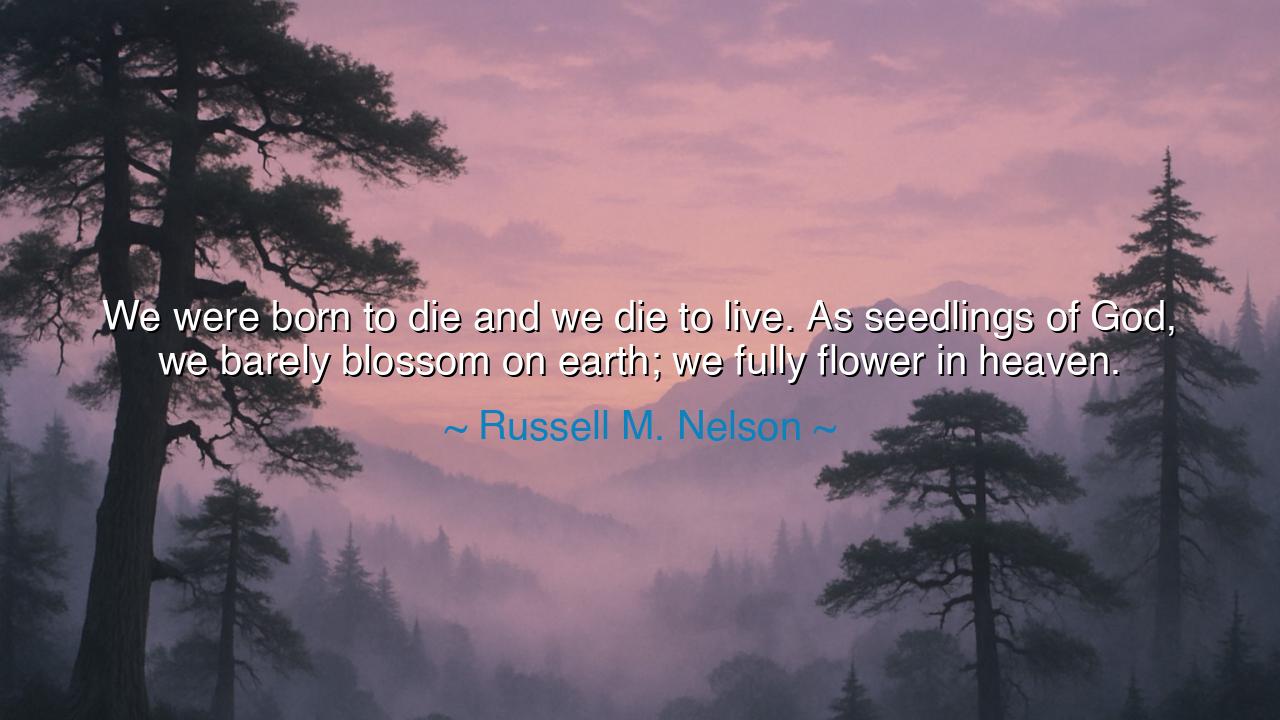
We were born to die and we die to live. As seedlings of God, we
We were born to die and we die to live. As seedlings of God, we barely blossom on earth; we fully flower in heaven.






Hear the eternal wisdom of Russell M. Nelson, a healer of bodies and a shepherd of souls, who declared: “We were born to die and we die to live. As seedlings of God, we barely blossom on earth; we fully flower in heaven.” In these words breathes the essence of divine perspective—the understanding that mortal life, brief and fragile as it may seem, is but the first stirring of an eternal existence. Nelson, a prophet and a physician, saw through both the lens of science and the eye of faith. He knew that while the heart may cease to beat and the body return to dust, the soul continues its upward journey, reaching for the radiance of divine perfection.
The origin of this quote lies in his lifelong reflections on mortality and immortality. As a heart surgeon, Russell M. Nelson stood often at the threshold between life and death. He had held hearts in his hands and watched the spirit depart from the mortal form. Yet rather than despair, he felt reverence—he saw that death was not an end, but a passage, not a tragedy, but a transformation. When he spoke these words, he was reminding all who would listen that life’s fragility is not a curse but a design—that we were born to die, not as punishment, but as preparation for a higher and eternal life.
In calling us seedlings of God, Nelson invokes an image both tender and profound. The seed does not mourn its smallness, for within it lies the promise of a mighty tree. Likewise, each soul begins in the soil of mortality, nurtured by experience, watered by trial, and warmed by the light of divine love. We are planted in the world to grow, to reach, to learn, and then—through death—to be transplanted into eternity, where we shall flower in fullness. Death, then, is not decay, but divine cultivation. To the eye of faith, the grave is not a tomb, but a womb from which eternal life is born.
Consider the story of Joseph Smith, the Prophet of the Restoration, who, like a seed broken open, gave his life in faith. His death, tragic in the eyes of the world, became the beginning of a living legacy that has inspired millions. He once said that “the same sociality which exists among us here will exist among us there,” affirming that those bonds of love and learning we form in mortality are not lost but glorified beyond the veil. In his life and death, as in Nelson’s teaching, we see that to die is to live more deeply, to shed the husk of limitation and become what we were always meant to be.
This truth is echoed in nature, which is itself a parable written by the Creator’s hand. The caterpillar must die as a crawling thing before it can rise as a butterfly. The grain of wheat must fall into the earth and perish before it brings forth the golden harvest. So too must the human spirit pass through the veil of mortality to reach the radiance of eternity. The process is painful, yet purposeful; death, like winter, clears the way for spring. What seems like loss from below is renewal from above.
Nelson’s words also teach us not to fear the brevity of our mortal days. For what is time but the nursery of eternity? We are seedlings, and this life is our season of planting. Each act of kindness, each prayer, each sacrifice is a root stretching heavenward, preparing us for the bloom that shall never fade. To live well, therefore, is not to cling to the soil of the world, but to grow heavenward—to live so that when the Gardener calls us home, He finds us ready, upright, and full of light.
The lesson, then, is both simple and sublime: Do not fear death, nor waste life in the pursuit of things that wither. Instead, live each day with the awareness that you are eternal, a child of divine heritage destined for glory. Love deeply, forgive freely, serve humbly—these are the waters that nourish the soul’s growth. When sorrow comes, remember that the seed, too, must split before it sprouts. When loss breaks your heart, know that Heaven is already preparing your bloom.
And so, O child of immortality, remember always: We were born to die, and we die to live. Your mortal life is but the prelude to an eternal song, your earthly struggles the soil in which your celestial beauty grows. Walk with faith through the valley of mortality, and do not curse its shadows—for they make you reach for the light. In the end, you shall find that death is not your enemy, but your beginning; not your fall, but your flight. For as seedlings of God, we are destined to flower forever in the gardens of eternity.






AAdministratorAdministrator
Welcome, honored guests. Please leave a comment, we will respond soon